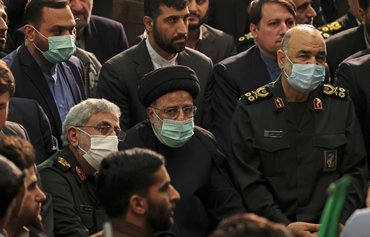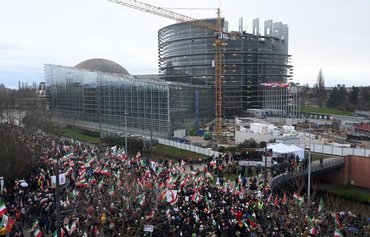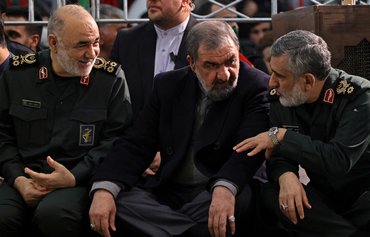The United States on Monday (January 23) moved to hold the Iranian regime to account for its human rights abuses, in co-ordination with the United Kingdom and European Union (EU), blacklisting 10 Iranian individuals and one entity.
In a new round of sanctions, the US Treasury blacklisted the Islamic Revolutionary Guard Corps (IRGC) Co-operative Foundation (Bonyad Taavon Sepahand), five of its board members and the Deputy Minister of Intelligence and Security.
It also designated four senior IRGC commanders who have been co-ordinating the Iranian regime's crackdown at the national and provincial levels.
The move targets "a key economic pillar of the IRGC, which funds much of the regime's brutal suppression", the US Treasury said in a statement.
![Behind the scenes of Rouhollah Zam's televised 'confessions' in 2020. IRIB's Ali Rezvani sitting in front of Zam with his back to the camera. Zam was executed two months later. [Tasnim]](/cnmi_am/images/2023/01/24/40429-iran-forced-confessions-600_384.jpg)
Behind the scenes of Rouhollah Zam's televised 'confessions' in 2020. IRIB's Ali Rezvani sitting in front of Zam with his back to the camera. Zam was executed two months later. [Tasnim]
It is the ninth round of US sanctions to target those responsible for the crackdown on peaceful protesters in Iran and for limiting access to the internet.
The IRGC Co-operative Foundation, an economic conglomerate that has been censured before under counterproliferation and counterterrorism authorities, manages the group's investments and presence in numerous economic sectors.
It serves as a slush fund for the IRGC's personnel and their business interests, the US Treasury said.
"Though ostensibly established to support IRGC service members, the IRGC Co-operative Foundation has morphed into a wellspring of corruption and graft, perpetrated by senior members of the organisation," it said.
"IRGC Co-operative Foundation funds have likewise supported the IRGC's military adventures abroad, including into the pockets of militant groups associated with the IRGC's external operations arm, the IRGC Quds Force."
The foundation's board of directors chairman, Ali Asghar Norouzi, "played a crucial role in facilitating the transfer of funds and weapons to regional proxies in the Middle East", the Treasury said.
Sanctioned along with him are Seyyed Amin Ala Emami Tabatabai, vice chairman of the board of directors, and board members Ahmad Karimi, Yahya Ala'oddini and Jamal Babamoradi.
Minister, IRGC commanders face censure
Among the blacklisted individuals is Deputy Minister of Intelligence and Security Naser Rashedi, of Iran's Ministry of Intelligence and Security, which was previously designated for its role in a wide range of human rights abuses.
These include beatings, sexual abuse, surveillance and censorship, as well as the coerced confessions of prisoners.
IRGC commanders from around the country also have been sanctioned.
Facing censure are IRGC commander in Qom Hossein Tanavar; IRGC commander of the West Region headquarters in Kermanshah Mohammad Nazar Azimi; and IRGC deputy commander of the West Region Kourosh Asiabani.
Also facing censure is the IRGC commander in Isfahan province, Mojtaba Fada, who allegedly ordered mass arrests and directed the use of live ammunition against unarmed protesters, killing over 20 people.
"Azimi and Asiabani command IRGC units that have allegedly committed some of the worst acts by Iranian security forces since the beginning of protests in September 2022," US Secretary of State Antony Blinken said in a statement.
"In Javanrud, a town in Kermanshah province, IRGC troops used live ammunition, including from semi-heavy machine guns, to quell protests, killing and wounding dozens," he said.
"The IRGC has shelled vehicles attempting to deliver blood bags to those wounded in local hospitals, preventing their delivery," he added.
New EU, UK sanctions on Iran
As part of its own crackdown on human rights abuses in Iran, the EU on Monday blacklisted 37 Iranian officials and entities, including the Minister of Sports and the IRGC command in 12 regions of Iran, the EU's official journal said.
Hardline lawmakers, senior state media officials and the head of the body setting the country's strict "morality" rules also were added to the list, AFP reported.
Separately, the United Kingdom on Monday sanctioned five more Iranian officials, including Deputy Prosecutor General Ahmad Fazelian, over what it said was the "horrific violence" the Iranian regime was inflicting on its own people.
Fazelian was responsible "for a judicial system characterised by unfair trials and egregious punishments, including use of the death penalty for political purposes", the UK government said.
"These sanctions, alongside designations by the European Union and the United States, demonstrate the international community's unified condemnation" of Tehran, it said.
The United Kingdom has now imposed 50 sanctions on Iranian individuals and organisations, including Tehran's prosecutor general last week.
Early this month, British media reported that the United Kingdom is preparing to formally designate the IRGC as a terrorist organisation.
The United States designated the IRGC as a terror group in 2019.
Other individuals sanctioned Monday include Kiyumars Heidari, commander in chief of the Islamic Republic of Iran's Ground Forces, and Hossein Nejat, the IRGC official in charge of security in Tehran.
"Those sanctioned today ... are at the heart of the regime's brutal repression of the Iranian people," said UK Foreign Secretary James Cleverly.
"The UK and our partners have sent a clear message through these sanctions that there will be no hiding place for those guilty of the worst human rights violations," he added.

![Iranian President Ebrahim Raisi (C), flanked by IRGC Quds Force (QF) commander Esmail Qaani (L) and IRGC commander Hossein Salami, attend a commemoration ceremony in Tehran on January 3, marking the third anniversary of the death of IRGC-QF commander Qassem Soleimani. [Atta Kenare/AFP]](/cnmi_am/images/2023/01/24/40430-iran-regime-irgc-600_384.jpg)






